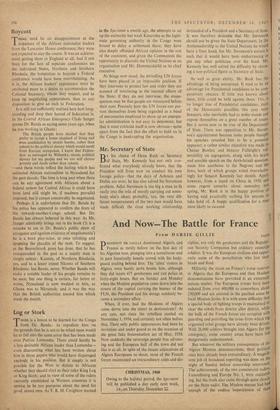Boycott
THERE need be no disappointment at the departure of the African nationalist leaders from the Lancaster House conference; they were not expected to stay the course. It was an achieve- ment getting them to England at all; had it not been for the lure of separate conferences on the individual States, Northern and Southern Rhodesia, the temptation to boycott a Federal conference would have been overwhelming. As it is, the African leaders' appearance must be attributed more to a desire to accommodate the Colonial Secretary, whom they respect, and to keep up negotiating appearances, than to any disposition to give an inch to Federation.
It is still not sufficiently realised here how long- standing and deep their hatred of federation is. In his Central African Emergency Clyde Sanger quotes Dr. Banda as saying some years ago, when he was working in Ghana; The British people have decided that they prefer to accept a lower standard of living and even annihilation by atomic bombs, rather than submit to the political slavery which would result from Russian occupation. I know that Federa- tion, as envisaged by Welensky, means political slavery for my people and we too will choose poverty and death rather than submit.
—and these words reflect the feeling which has animated African nationalism in Nyasaland for the past decade. The time is long past when there can be any agreement with Africans about a federal system for Central Africa; it could have been (and still might be, if madness prevails) imposed; but it cannot conceivably be negotiated.
Perhaps it is unfortunate that Dr. Banda by his antics has appeared to confirm the fears of the towards-another-Congo school. But Dr. Banda has always behaved in this way. As Mr. Sanger admirably brings out in his book ('it is a mistake to see in Dr. Banda's public show of arrogance and egotism evidence of megalomania') he is a born play-actor, at once relishing and despising the plaudits of the mob. To suggest, as the Beaverbrook press has done, that he has masqueraded in the past as a saintly man is simply untrue: KatInda, of Northern Rhodesia, yes, and to a lesser extent Nkomo of Southern Rhodesia; but Banda, never. Whether Banda will make a notable leader of his people remains to be seen; but one thing is certain, for better or worse, Nyasaland is now wedded to him, as Ghana was to Nkrumah; and it was the way that the British authorities treated him which made the match.


































 Previous page
Previous page